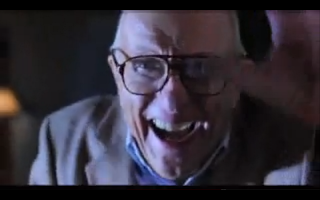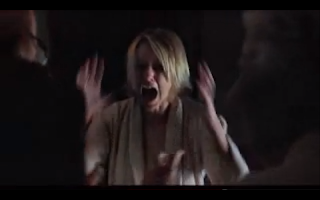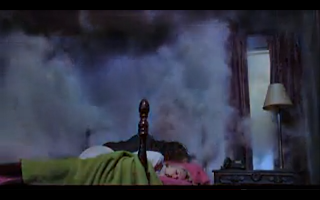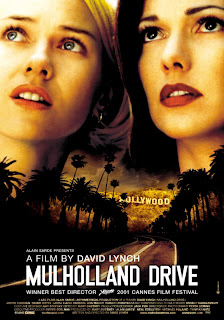 A series of blogs are going to analyze the end of the movie Mulholland Drive through three different perspectives. Firstly, Mulholland drive has successfully pleased audience in a primitive way by creating certain environments. Secondly, the end of movie evokes feelings of helplessness and confusion. Last but not the least, this movie strongly proved that cinema exists as a haunted body and organization of consciousness.
A series of blogs are going to analyze the end of the movie Mulholland Drive through three different perspectives. Firstly, Mulholland drive has successfully pleased audience in a primitive way by creating certain environments. Secondly, the end of movie evokes feelings of helplessness and confusion. Last but not the least, this movie strongly proved that cinema exists as a haunted body and organization of consciousness. Mulholland Dr.

Search Post
Sunday, December 4, 2011
Behind the Scene
 A series of blogs are going to analyze the end of the movie Mulholland Drive through three different perspectives. Firstly, Mulholland drive has successfully pleased audience in a primitive way by creating certain environments. Secondly, the end of movie evokes feelings of helplessness and confusion. Last but not the least, this movie strongly proved that cinema exists as a haunted body and organization of consciousness.
A series of blogs are going to analyze the end of the movie Mulholland Drive through three different perspectives. Firstly, Mulholland drive has successfully pleased audience in a primitive way by creating certain environments. Secondly, the end of movie evokes feelings of helplessness and confusion. Last but not the least, this movie strongly proved that cinema exists as a haunted body and organization of consciousness. Primitive Pleasure
 Why the Mulholland Drive pleased the audience in a primitive way? It is better to know that why people love scared movies before we understand this question. As Science Daily reported, “Horror movie viewers are happy to be unhappy. This novel approach to emotion reveals that people experience both negative and positive emotions simultaneously -- people may actually enjoy being scared, not just relief when the threat is removed.” (ScienceDaily) In other words, for some people, to be scared is a kind of primitive pleasure. The Mulholland Drive has successfully created this kind of pleasure for the audience in its last 10 minutes.
Why the Mulholland Drive pleased the audience in a primitive way? It is better to know that why people love scared movies before we understand this question. As Science Daily reported, “Horror movie viewers are happy to be unhappy. This novel approach to emotion reveals that people experience both negative and positive emotions simultaneously -- people may actually enjoy being scared, not just relief when the threat is removed.” (ScienceDaily) In other words, for some people, to be scared is a kind of primitive pleasure. The Mulholland Drive has successfully created this kind of pleasure for the audience in its last 10 minutes. Diane's Suicide
The end of the movie starts with a pan up from the blue key to a medium close-up shot to the dull Diane in her dark room.
 After that, it cuts the blue key and Diane in one medium shot. By now, the director has created a sense of anxious feeling for the audience.
After that, it cuts the blue key and Diane in one medium shot. By now, the director has created a sense of anxious feeling for the audience. The scaring music starts playing while the eye match shot cutting back and force between Diane and the key. As an audience, one will easily get nervous after seeing the close-up shot of the scared Diane and hearing a frightening soundtrack.
The scaring music starts playing while the eye match shot cutting back and force between Diane and the key. As an audience, one will easily get nervous after seeing the close-up shot of the scared Diane and hearing a frightening soundtrack. 
A climax is pending. With the sudden tap, the lightening on Diane’s eye, and the screaming grandparents, not only Diane, but the audience is almost going to pieces.



 Finally, Diane crumbled after seeing the chasing grandparents, and she kills herself with handgun. Everything is gone but the smoke. Silence takes over everything and helps to smooth the audience’s tension.
Finally, Diane crumbled after seeing the chasing grandparents, and she kills herself with handgun. Everything is gone but the smoke. Silence takes over everything and helps to smooth the audience’s tension. Memories and Illusions
With the soundtrack starting again, beautiful memories of the happy time between Diane and Camillar begin to flash on the screen on the background of a night city. Everybody is moved by the love between these two girls at this moment. (Maybe it is just Diane’s love) Unfortunately, the director does not give us time to feel sorry about this love. He cuts to the Silent Pub and confuses us by showing the women with blue hair saying “silencio”. However, if you think it more carefully, it seems that the director was trying to make it more like an illusion not confusion.
Symbolization
Although the end of the Mulholland Drive is about what is happening in reality, it still evokes plenty feelings of helplessness and confusion. Taking the blue key and the elderly couple as examples, several things have made the audience confused.
key
 What does the blue key mean and what does it open? The blue key appears several times both in Diane’s dream and in reality. In reality, the blue key is a secret code between the hit man and her after the murder. Diane is frustrated by the feelings of guilt and fear when she sees the key because she will find out whether Diane died or not by using it to open the blue box. In this sense, the blue key can not only open the blue box but also open the darkness, the worst parts in Diane’s soul. Some people suggest the blue key also represents several other things such as searching, penis, love, fear and murder. Furthermore, according to Dream Dictionary, “To see a key in your dream, symbolizes opportunities, access, control, secrets, or responsibilities. You may be locking away your own inner feelings and emotions. As with most dreams, look for the obvious connections by comparing the details or the theme of your dream to your daily life. Are you trying to figure something out and "unlock" a puzzling question? Do you wish to hide something? Are you locking something up or are you opening the door?” (Dream Dictionary)
What does the blue key mean and what does it open? The blue key appears several times both in Diane’s dream and in reality. In reality, the blue key is a secret code between the hit man and her after the murder. Diane is frustrated by the feelings of guilt and fear when she sees the key because she will find out whether Diane died or not by using it to open the blue box. In this sense, the blue key can not only open the blue box but also open the darkness, the worst parts in Diane’s soul. Some people suggest the blue key also represents several other things such as searching, penis, love, fear and murder. Furthermore, according to Dream Dictionary, “To see a key in your dream, symbolizes opportunities, access, control, secrets, or responsibilities. You may be locking away your own inner feelings and emotions. As with most dreams, look for the obvious connections by comparing the details or the theme of your dream to your daily life. Are you trying to figure something out and "unlock" a puzzling question? Do you wish to hide something? Are you locking something up or are you opening the door?” (Dream Dictionary) THE ELDERLY COUPLE
 If someone looks back the last 10 minutes of Mulholland Drive, he probably will question why the elderly couple appears again and what the identity of the eldly couple is. Some people believe the elderly couple represents parental figures. There is another opinion says the old couple is just an excuse for Diane to comfort herself. “When things do not work out the way Diane has hoped, she concludes that she was the victim of some scheme by the seemingly kind couple.”(Lost on Mulholland Drive)
If someone looks back the last 10 minutes of Mulholland Drive, he probably will question why the elderly couple appears again and what the identity of the eldly couple is. Some people believe the elderly couple represents parental figures. There is another opinion says the old couple is just an excuse for Diane to comfort herself. “When things do not work out the way Diane has hoped, she concludes that she was the victim of some scheme by the seemingly kind couple.”(Lost on Mulholland Drive) It is more interesting if you consider this couple as Adam and Camilla. Their appearances are pretty much similar and you can also explain why the elderly couple chasing Diane in the end of the movie by using this theory. They are seeking vengeance because Diane had them murdered.
Character Identification
 The end of Mulholland Drive is a good example to prove that cinema exists as a haunted body and organization of consciousness. It sutures the audience into the film by using character identification. Diane is a loser in her love story. She loves Camillar, and at the same time, she also lives under her wing because Camillar helped Diane out all her life and career. That makes the relationship more complicated. When Diane wakes up from her dream, she falls into guilty and extreme fears. Diane’s struggle in her mind simply reflects people’s conflicting thoughts about love and hate. With the camera eye, we as audience are also pending mental collapse. Moreover, Diane’s choice of suicide seems reasonable for us because every murder will make the same decision. Isn’t it possible that we are Diane at that moment, so that we can only relief by our death?
The end of Mulholland Drive is a good example to prove that cinema exists as a haunted body and organization of consciousness. It sutures the audience into the film by using character identification. Diane is a loser in her love story. She loves Camillar, and at the same time, she also lives under her wing because Camillar helped Diane out all her life and career. That makes the relationship more complicated. When Diane wakes up from her dream, she falls into guilty and extreme fears. Diane’s struggle in her mind simply reflects people’s conflicting thoughts about love and hate. With the camera eye, we as audience are also pending mental collapse. Moreover, Diane’s choice of suicide seems reasonable for us because every murder will make the same decision. Isn’t it possible that we are Diane at that moment, so that we can only relief by our death? The end of Mulholland Drive has created a primitive pleasure for the audience by irritating their sensory feelings. On the other hand, It evokes plenty feelings of confusion by using symbolism. Lastly, it has successfully sutured us into the film by using the camera and the soundtrack.
Reference
Dream Dictionary (2000): Key Retrieved April 1, 2010 from: http://www.dreammoods.com/dreamdictionary/k.htm
Science Daily (1995): Why Do People Love Horror Movies? They Enjoy Being Scared Retrieved April 1, 2010 from: http://www.sciencedaily.com/releases/2007/07/070725152040.htm
Subscribe to:
Comments (Atom)





